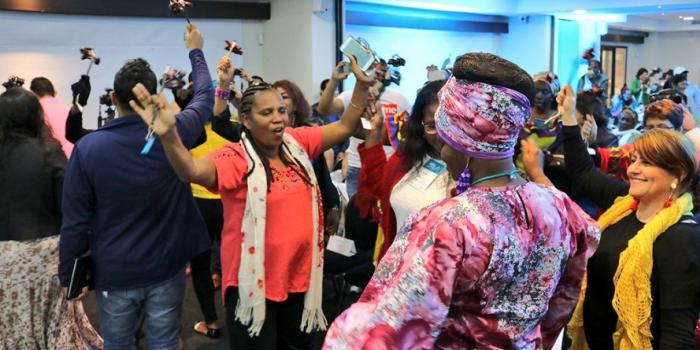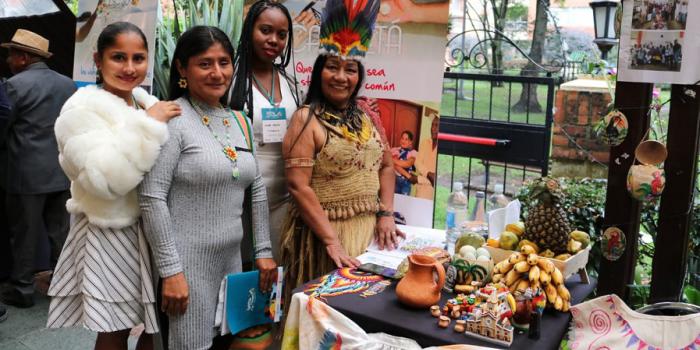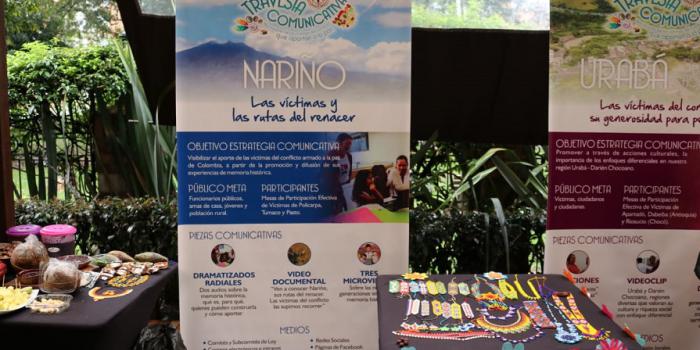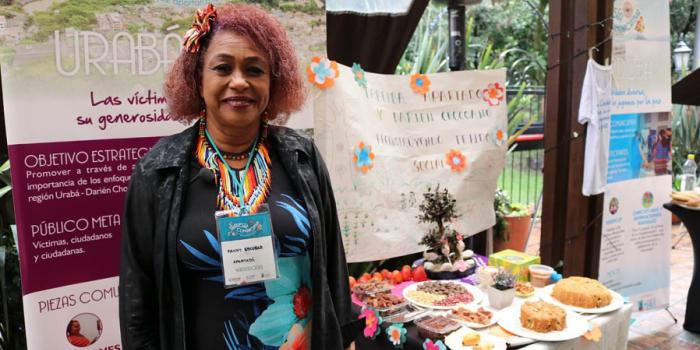
Victims presented songs, dramatized and other pieces of communication to contribute to peace
Communicative Crossing is the name with which the international cooperation agencies IOM and USAID named the strategy to strengthen the communication skills of 78 victims in 7 departments of the country.




With a water ritual, the event for the presentation of communicative products that resulted from the regional strategies built by the International Organization for Migration (IOM), the United States Agency for International Development (USAID) and the Women, art and life Foundation, (MAVI), with 78 representatives of Victims municipal tables of participation from Antioquia, Caquetá, Cauca, Córdoba, Chocó, Nariño and Urabá.
A person from each department went on stage and placed, symbolically, a small bowl of water and other products from his region, on a cloth with a painted mandala and around a large bowl of water, surrounded by flowers and white candles.
Meanwhile, all the attendees were sounding the indigenous callers made with seeds, which they held in their hands, to attract the strength of ancestors and the purification of energy in the construction of peace.
That was the introduction to the presentation of compact discs with songs, video clips, cartoons, dramatized radios, primers, memes, parades, and documentaries, whose elaboration started from workshops with leaders that integrate the tables of participation of victims of 21 municipalities of the country, especially women, LGBTI people, young people and people with disabilities.
Nairo Visanche, member of LGBTI table in the municipality of Apartadó, Antioquia, spoke about how he felt throughout the process: "My experience in the Crossing was very good because I learned from what each one lived in violence, each person has problems and difficulties to get ahead".
In the workshops, the victims of conflict expressed their knowledge, experiences and forms of communication, strengthened their communication skills to transmit their rights to society and deepened knowledge about the Victims Law and the Peace Agreement. They chose relevant topics in their regions and created the prototypes of the pieces of communication whose final production was made by the MAVI Foundation.
Álvaro Álvarez Hernández, victim of the municipality of Tierralta, Córdoba, told how the experience transformed him: "We embarked on this Journey since October, it was not easy, I am the author of the song 'Un parrandón por la diversidad' (A big party for diversity). It is so called because we did not accept people of different sexual orientation, Afro people, indigenous people said 'that Indian stinks', but as time went by, the mind was opened and I understood that we are all made in the image and likeness of God; What we wanted with this song was to be inclusive and reach the institutionality, the society, because we should never discriminate a person, we all have our rights and our values".
Before being presented in Bogota, in the Hotel 101 Park House-Boutique, the communicative pieces had already been exhibited in Apartadó, Florencia, Medellín, Montería, Popayán, Quibdó and Pasto.
In those places we listened to the radio series La Mariposa Esperanza which is a fable about sexual violence, a video entitled "In War, life is the victim", a video documentary called "Loosen up, do not be indifferent to peace", the song Cocorobé of participation, the cartoon "Don Confucio, the path of transformation", a series of microvideos titled Every minute counts, among many other communicative pieces.
The Victims Unit, the IOM and USAID expressed their willingness to coordinate efforts to link survivors of armed conflict throughout the country with the methodology used in the Communication Crossing.
(FIN/DRR/LMY)






